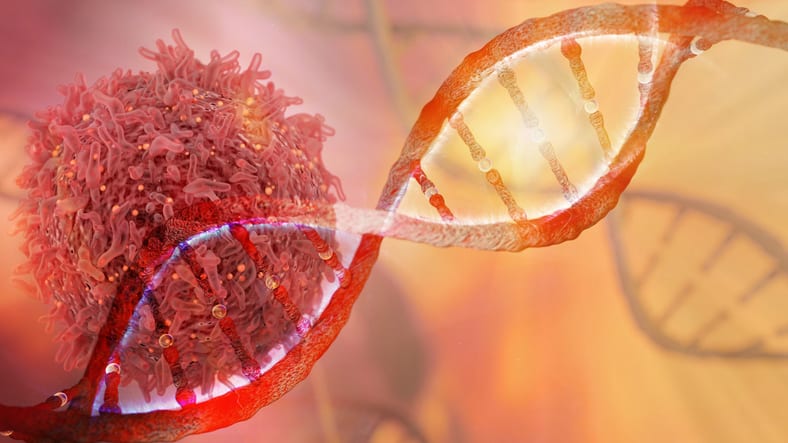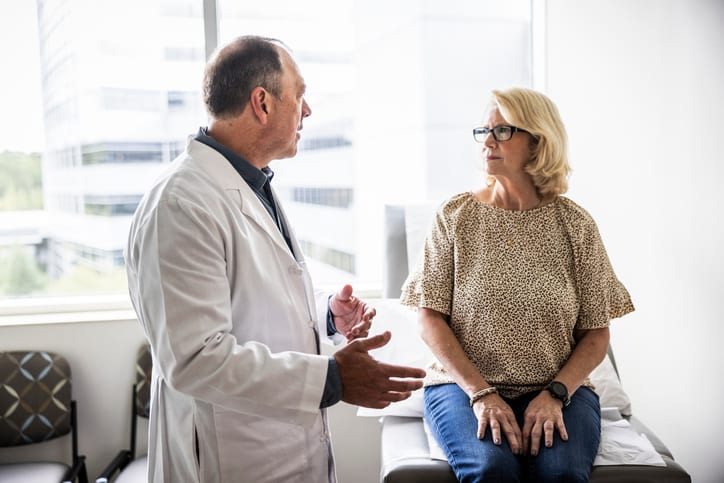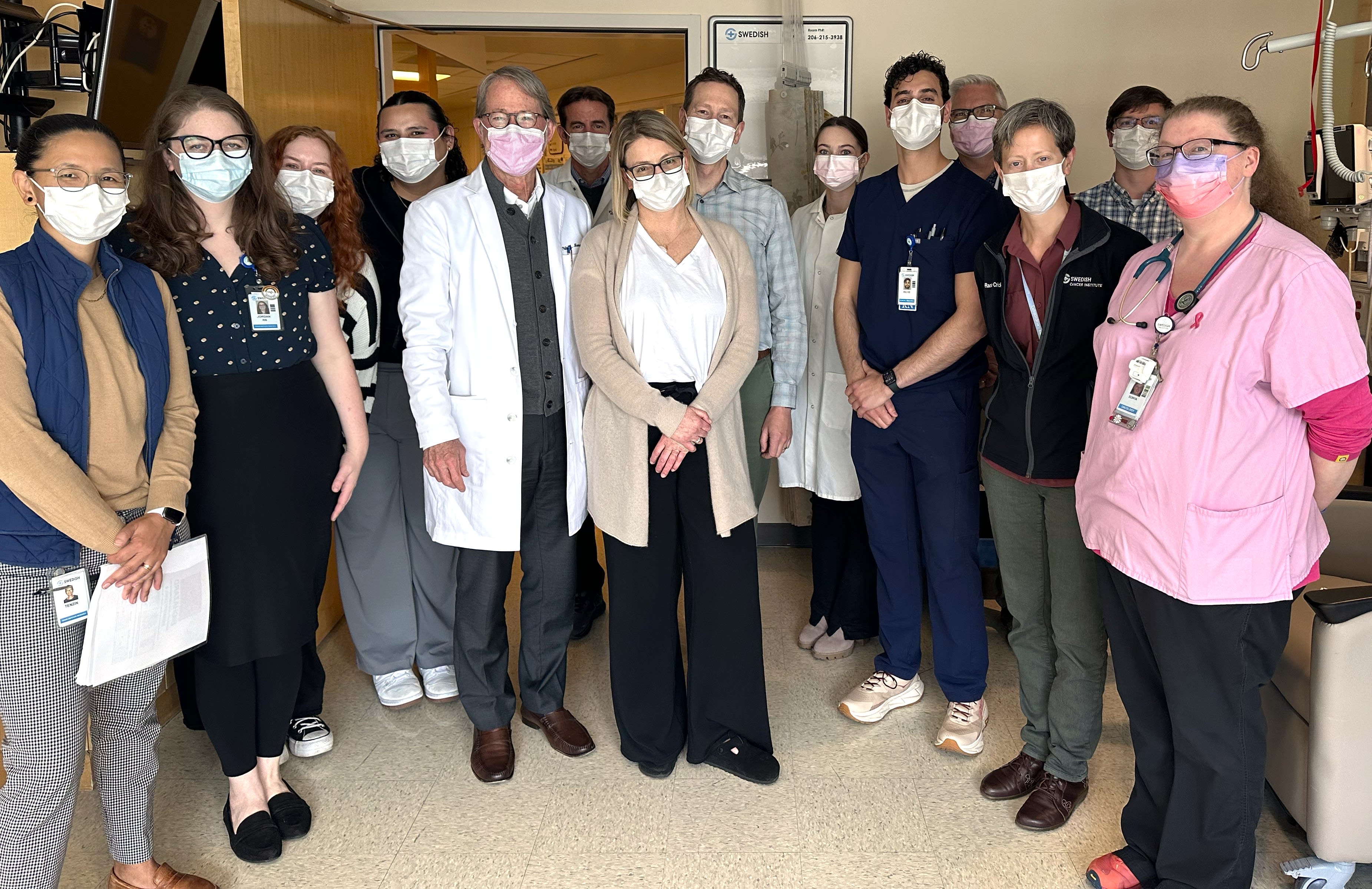Immunotherapy
Using the Power of the Body's Immune System
At the Providence Swedish Cancer Institute, we use advanced immunotherapy to help your immune system fight cancer. This approach can lead to long-lasting improved outcomes and often causes fewer side effects than traditional treatments. We also offer a range of support services focused on your overall well-being throughout every part of your care.

Treatment Overview
Immunotherapy helps your immune system recognize and attack threats, including cancer. Some treatments boost immune activity, while others help the body better recognize and target cancer cells. These therapies often use substances found naturally in the immune system — or lab-made versions — to support your body’s defenses.
While immunotherapy has been studied for decades, it became widely available in the early 2000s and continues to evolve quickly. At the Providence Swedish Cancer Institute, we’re proud to offer advanced options like CAR T-cell therapy for certain blood cancers — and we’re one of only two programs in Washington state to do so. Our expert hematologists and oncologists also provide autologous stem cell transplants for blood cancers, as well as other types of cancers and recurrences.
What to Expect
At the Providence Swedish Cancer Institute, we’ll guide you through the planning stages of immunotherapy through recovery and future treatment if needed. Your care team is here to support your physical healing, emotional well-being, and personal goals, so you can move forward with confidence.
Before starting immunotherapy, your care team will go over your treatment plan and explain what to expect. You may need lab tests or imaging before your first session. Most immunotherapy is given through an IV, so plan to wear comfortable clothes and bring something to help pass the time. You may also want to arrange a ride home, as some people feel tired afterward. Unless told otherwise, eat a light meal and stay hydrated before your appointment.
After each session, you might feel tired or experience mild side effects like chills, fever, or body aches. Serious reactions are rare, but we’ll monitor you closely and check in regularly to track your progress. Most people can return to daily activities soon after treatment. If you’re taking immunotherapy at home, we’ll give you clear instructions and stay connected to make sure you feel supported throughout your care.
Immunotherapy helps your immune system find and attack cancer cells more effectively. For some people, it offers longer-lasting results and fewer side effects than chemotherapy or radiation. It often doesn’t cause hair loss, which can help with some of the physical and emotional side effects. Immunotherapy can also be a powerful option when other treatments haven’t worked, offering new paths forward and renewed hope for many patients.
Immunotherapy is generally well tolerated, but side effects may include:
- Fatigue
- Fever or chills
- Skin rash or itching
- Digestive issues like nausea or diarrhea
- Inflammation in the lungs, liver, or other organs
Your care team will monitor you closely, manage any side effects, and adjust treatment if needed.
Your care team is here to support you throughout and after your treatments. Regular checkups are important so we can continue to manage any of your ongoing treatment needs and watch for signs of recurrence. Services are also available to help you through every treatment stage.
Learn more about our supportive care services.
Frequently Asked Questions
Your immunotherapy team will include medical oncologists overseeing your treatment plan, infusion nurses who administer your care, and pharmacists who prepare your medication. Together, they monitor your progress, help manage side effects, and make sure you feel supported throughout your treatment.
Immunotherapy comes in several forms. Some treatments, like checkpoint inhibitors or monoclonal antibodies, help your immune system find and attack cancer cells. Others, like CAR T-cell therapy, use your own modified immune cells. Therapies may be given through an IV, a shot, or as a pill. Your doctor will talk with you about the option that best fits your treatment plan and targets your specific cancer.
Immunotherapy is often part of a larger treatment plan. Your care team may also recommend surgery, radiation, chemotherapy, or targeted therapies, depending on your diagnosis and how the cancer responds. If additional treatment is needed, your doctors will explain why, walk you through what to expect, and work with you to create a plan that fits your needs and goals.
Immunotherapy is often given as a series of treatments over time. Sessions can last anywhere from 30 minutes to several hours, depending on your specific plan. Some people receive treatment every few weeks for several months or longer. In some cases, maintenance therapy is recommended to keep the immune system active. Your care team will walk you through the schedule and adjust your plan based on how your body responds.
Recovery from immunotherapy varies for each person. After a session, you may feel tired or have mild side effects like a rash or flu-like symptoms, but most people can return to their usual activities after a day or two. Over time, your care team monitors your progress to manage any side effects and make sure your treatment is working as expected.
Hair loss is not common with immunotherapy. Unlike chemotherapy, which affects many fast-growing cells in the body — including hair follicles — immunotherapy works in a more targeted way by helping your immune system fight cancer. Some people may notice mild hair thinning, but most do not lose their hair during treatment.
We provide a full range of supportive care services to support you during and after your cancer treatment. Some of these services include:
- Art therapists
- Cancer rehabilitation (onco-physiatry)
- Care coordinators
- Genetic counseling (cancer geneticist)
- Health educators
- Medical massage (edema, lymphedema management)
- Music therapist
- Naturopaths
- Nutritionists
- Oncology nurses
- Social workers
- Speech and language pathology
We can also help with finances, food, transportation, and other challenges for eligible patients through our patient assistance fund.
See the full list of supportive care services.
Note: Some services are provided by local partners and vary based on location. Please contact your clinic for more information.
Patients have access to hundreds of clinical trials involving most cancer types. We are often among the first in the U.S. to provide access to Phase 1 trials — the first stage of evaluating treatments in humans. Please note, we open new trials often. Check with your clinician for the latest in upcoming trials.
Learn more and find out if a clinical trial could become part of your treatment plan.
News & Info From Our Experts



